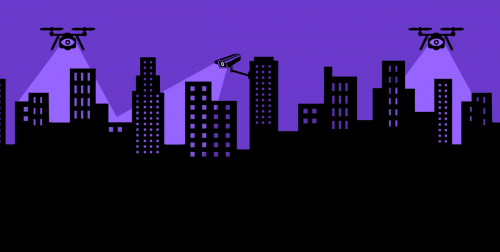Dozens of policing agencies are currently using cell-site simulators (CSS) by Jacobs Technology and its Engineering Integration Group (EIG), according to newly-available documents on how that company provides CSS capabilities to local law enforcement.
A proposal document from Jacobs Technology, provided to the Massachusetts State Police (MSP) and first spotted by the Boston Institute for Nonprofit Journalism (BINJ), outlines elements of the company’s CSS services, which include discreet integration of the CSS system into a Chevrolet Silverado and lifetime technical support. The proposal document is part of a winning bid Jacobs submitted to MSP earlier this year for a nearly $1-million contract to provide CSS services, representing the latest customer for one of the largest providers of CSS equipment.

An image of the Jacobs CSS system as integrated into a Chevrolet Silverado for the Virginia State Police. Source: 2024 Jacobs Proposal Response
The proposal document from Jacobs provides some of the most comprehensive information about modern CSS that the public has had access to in years. It confirms that law enforcement has access to CSS capable of operating on 5G as well as older cellular standards. It also gives us our first look at modern CSS hardware. The Jacobs system runs on at least nine software-defined radios that simulate cellular network protocols on multiple frequencies and can also gather wifi intelligence. As these documents describe, these CSS are meant to be concealed within a common vehicle. Antennas are hidden under a false roof so nothing can be seen outside the vehicles, which is a shift from the more visible antennas and cargo van-sized deployments we’ve seen before. The system also comes with a TRACHEA2+ and JUGULAR2+ for direction finding and mobile direction finding.

The Jacobs 5G CSS base station system. Source: 2024 Jacobs Proposal Response
CSS, also known as IMSI catchers, are among law enforcement’s most closely-guarded secret surveillance tools. They act like real cell phone towers, “tricking” mobile devices into connecting to them, designed to intercept the information that phones send and receive, like the location of the user and metadata for phone calls, text messages, and other app traffic. CSS are highly invasive and used discreetly. In the past, law enforcement used a technique called “parallel construction”—collecting evidence in a different way to reach an existing conclusion in order to avoid disclosing how law enforcement originally collected it—to circumvent public disclosure of location findings made through CSS. In Massachusetts, agencies are expected to get a warrant before conducting any cell-based location tracking. The City of Boston is also known to own a CSS.
This technology is like a dragging fishing net, rather than a focused single hook in the water. Every phone in the vicinity connects with the device; even people completely unrelated to an investigation get wrapped up in the surveillance. CSS, like other surveillance technologies, subjects civilians to widespread data collection, even those who have not been involved with a crime, and has been used against protestors and other protected groups, undermining their civil liberties. Their adoption should require public disclosure, but this rarely occurs. These new records provide insight into the continued adoption of this technology. It remains unclear whether MSP has policies to govern its use. CSS may also interfere with the ability to call emergency services, especially for people who have to use accessibility technologies for those who cannot hear.
Important to the MSP contract is the modification of a Chevrolet Silverado with the CSS system. This includes both the surreptitious installment of the CSS hardware into the truck and the integration of its software user interface into the navigational system of the vehicle. According to Jacobs, this is the kind of installation with which they have a lot of experience.
Jacobs has built its CSS project on military and intelligence community relationships, which are now informing development of a tool used in domestic communities, not foreign warzones in the years after September 11, 2001. Harris Corporation, later L3Harris Technologies, Inc., was the largest provider of CSS technology to domestic law enforcement but stopped selling to non-federal agencies in 2020. Once Harris stopped selling to local law enforcement the market was open to several competitors, one of the largest of which was KeyW Corporation. Following Jacobs’s 2019 acquisition of The KeyW Corporation and its Engineering Integration Group (EIG), Jacobs is now a leading provider of CSS to police, and it claims to have more than 300 current CSS deployments globally. EIG’s CSS engineers have experience with the tool dating to late 2001, and they now provide the spectrum of CSS-related services to clients, including integration into vehicles, training, and maintenance, according to the document. Jacobs CSS equipment is operational in 35 state and local police departments, according to the documents.
EFF has been able to identify 13 agencies using the Jacobs equipment, and, according to EFF’s Atlas of Surveillance, more than 70 police departments have been known to use CSS. Our team is currently investigating possible acquisitions in California, Massachusetts, Michigan, and Virginia.

An image of the Jacobs CSS system interface integrated into the factory-provided vehicle navigation system. Source: 2024 Jacobs Proposal Response
The proposal also includes details on other agencies’ use of the tool, including that of the Fontana, CA Police Department, which it says has deployed its CSS more than 300 times between 2022 and 2023, and Prince George's County Sheriff (MO), which has also had a Chevrolet Silverado outfitted with CSS.
Jacobs isn’t the lone competitor in the domestic CSS market. Cognyte Software and Tactical Support Equipment, Inc. also bid on the MSP contract, and last month, the City of Albuquerque closed a call for a cell-site simulator that it awarded to Cognyte Software Ltd.













